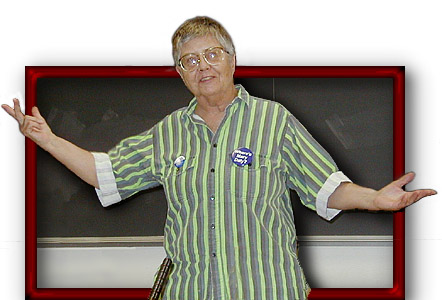
Mary Daly
Biography
Mary Daly is one of the leading voices of modern feminist theology and a self-described "radical lesbian feminist." Daly was born October 16, 1928, the only child in a working class Irish Catholic family in Schenectady, New York. She attended Catholic primary schools where she developed interest in philosophy and theology. Encouraged by her parents, she realized her academic aspirations in a Catholic system that limited the rise of women. After receiving a B.A. degree from the College of St. Rose in Albany, New York and an M.A. degree from Catholic University in Washington, D.C., she earned her doctorate in religion from St. Mary's College in Notre Dame, Indiana. Since no U.S. institution would grant a Ph.D. in theology to a woman, Daly went to Switzerland and earned doctorates in philosophy and in theology from the University of Freiburg.
Daly was hired as an assistant professor at Boston College in 1967, a Jesuit school that only enrolled men in the undergraduate school at the time. She immediately achieved recognition for the publication of The Church and the Second Sex (Harper and Row) in 1968, in which she argued that the Catholic Church had systematically oppressed women for centuries. The school then tried to dismiss her, but due to widespread support from students (men) and the larger community, she was granted tenure and began a vibrant, thirty-year-plus teaching career that was often in contention with the institutional hierarchy.
Daly came out as a lesbian in the early 1970s. Her next book, Beyond God the Father: Toward a Philosophy of Women's Liberation (Beacon, 1973) revealed her move from Christian reformist to radical, post-Christian feminism. In this book and her subsequent scholarship she developed a sweeping analysis of patriarchy--across all religious and ideological expressions--as the root of women's oppression and of all social ills in which people are treated as objects. She encouraged women to "spiral into freedom" by renaming and reclaiming ancient women-centered realities that were stolen and eradicated by patriarchy. She used language in new ways to redefine women's realities, using and reclaiming words such as "goddess," "witch," "crone," and "hag." Her bold and audacious insights are reflected in this writing in the New Yorker (February 26, 1996):
Women who are pirates in a phallocratic society are involved in a complex operation. First, it is necessary to plunder--that is, righteously rip off gems of knowledge that the patriarchs have stolen from us. Second, we must smuggle back to other women our plundered treasures. In order to invent strategies that will be big and bold enough for the next millennium, it is crucial that women share our experiences: the changes we have taken and the choices that have kept us alive. They are my pirate's battle cry and wake-up call for women who want to hear.

Mary Daly As one of the most influential feminist thinkers and theologians of the second half of the twentieth century, Daly had a profound impact upon other feminist writers and scholars. As colleague Mary E. Hunt observed in announcing her death to the Women's Alliance in Theology, Ethics and Ritual (WATER) email list: "Her contributions to feminist theology, philosophy, and theory are many, unique, and if I may say so, world-changing. She created intellectual space; she set the bar high. Even those who disagreed with her are in her debt for the challenges she offered...She always advised women to throw our lives as far as they would go. I can say without fear of exaggeration that she lived that way herself."
Daly's ideas sparked controversy in arenas other than male-dominated bastions. The focus of her social analysis on sex and gender brought criticism that she did not give recognition to issues of racial oppression. Her allegedly essentialist views of sex and gender led to negative perspectives on transgender persons, particularly MTF transwomen.
Later in her teaching career, when Boston College enrolled a larger number of women, Daly limited enrollment in her advanced women's studies classes to women, noting that the presence of men would inhibit frank discussion. She did allow men in her introductory classes and offered to tutor them privately in her advanced classes. In 1998, a male student supported by the conservative Center for Individual Rights threatened to file a lawsuit over being denied enrollment in one of her classes. When the university tried to force Daly to admit the student to her class, she took a leave of absence. Boston College claimed Daly had resigned, prompting Daly to file a suit against the university. As the trial was about to begin, a settlement was announced on February 7, 2001. The terms of the settlement were confidential and Daly did not return to Boston College.
Daly's other published books are:
Gyn/Ecology: The Metaethics of Radical Feminism (Beacon, 1978);
Pure Lust: Elemental Feminist Philosophy (Beacon, 1984);
Websters' First New Intergalactic Wickedary of the English Language (Beacon, 1987);
Outercourse: The Be-Dazzling Voyage Containing Reflections from My Logbook of a Radical Feminist Philosopher (Harper 1992);
Quintessence...Realizing the Archiac Future: A Radical Elemental Feminist Manifesto (Beacon, 1999); and
Amazon Grace: Re-Calling the Courage to Sin Big (Palgrave Macmillan, 2006).
Mary Daly lived the last years of her life in Newton Centre, Massachusetts. She died on January 3, 2010, at the age of 81, after a long period of declining health.
(This biographical statement compiled from obituaries by Margalit Fox, The New York Times; Thomas C. Fox, National Catholic Reporter Online; and Liz Highleyman, Bay Area Reporter. Photo by Joy F. Morrison.)
Biography Date: January, 2010
Additional Resources
Tags
Catholic (Roman) | Author/editor | Feminism | Theology | Women and Religion
Citation
“Mary Daly | Profile”, LGBTQ Religious Archives Network, accessed April 23, 2024, https://lgbtqreligiousarchives.org/profiles/mary-daly.
Remembrances